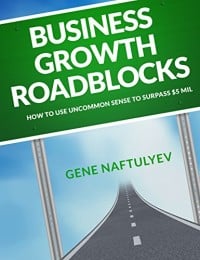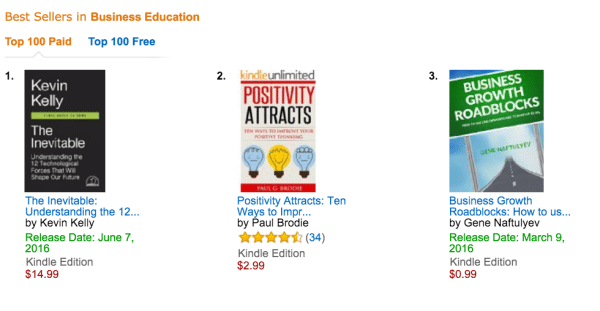
Having a goal and a plan to get there, even if you deviate from the plan at times, helps to make sure the time you spend running the company is time well spent.
Entrepreneurs start businesses for many reasons. Some want to grow a business and sell it for millions, others want the freedom to run a business and control their own destinies, while others still want to create an annuity that will be within their family for generations. Whatever reason you started the business, it’s important to have an end game in mind. The end game doesn’t need to happen when you get old! For many business owners, the faster they get to the sale of the business, the sooner they can start to enjoy life more and work less. Of course, for some it actually means the sooner they sell this business, the sooner they can be back in startup territory with their new business opportunities.
Regardless of what the ideal end scenario looks like, it’s important to plan it out because the shortest path to each possible end game may very well follow a different route. A company that is built to sell will focus a lot more on fast growth and EBITDA. While a company that is built to provide freedom, both financial and creative, to the owner may grow much slower, but allow greater profits to be taken out by the owners.
Having a goal and, more importantly, a business plan that defines milestones for the company on its path to the goal helps to keep focus on the most important aspects of running a business. Quite often, it may feel like the owners may be working 60-hour weeks just to keep the business afloat.
Succession Plan
While we’re on the topic of planning, a succession plan is something that most small business owners don’t have. It may not be as important to a small business because the business is so dependent on the owner’s involvement for its existence, that without the owner, there is no business. However, once the business grows past $5mm, and certainly over $25mm, the dependence on any single person, including the founder or owner, should be greatly reduced. So a succession plan is not only nice to have once the business grows, but is very much needed for the future success of the business and the well-deserved payout of dividends or buyout payments to the founder.
You should at least go through a yearly exercise to determine what constitutes your role. Who would have to pick up each piece of your role, and what changes in the organizational structure would benefit the company if you were to suddenly disappear? This is a great exercise to do both for the what-if scenario of being incapacitated as well as for a planned exit.
The ultimate goal for most entrepreneurs when they are starting a business is hoping that their business, whether it’s a family business or sold to an investor, can outlive them. I’ve only met one person who didn’t agree with that sentiment in all my years. I suspect they saw their business as a pharaoh saw his kingdom, starting with him and ending with him! For everyone else, it’s vital not to neglect to have a succession plan.
Retirement Plan
Transition out of your business while you are still young enough to enjoy life if you can and start another one if you must.
While the topic of business succession is worth an entire book, I will say that most business owners are not comfortable with this topic and generally delay even conversations about it for years and years. It is important to remember that while the business is successful, employees are willing to follow management, and they in turn, the CEO or owner. However, if the owner waits too long in making retirement plans, the employees – including management – may lose confidence and take the matter into their own hands. I saw this unfortunate turn of events happen firsthand 20 years ago.
One of my clients was a $25mm+ company still run by the man who founded it 30 years earlier. He kept putting off retirement, and when he finally decided to retire, he expected that his management would happily buy him out to continue the business. Unfortunately for him, they realized that his only contribution in the last few years to the business was his name, and that in the end, his name was not worth the millions he wanted for the buyout. They didn’t see a value in the company other than the name, and so they left together, founded a company with a different name, and took almost all his clients with them. If you think about it, the less risky thing for a client to do is to go along with where the majority of the employees end up.
Of course, they were able to do this and circumvent non-compete agreements because by refusing his buyout offer, they effectively had to be laid off from a company that was shutting down, thereby avoiding contractual requirements. This is a real-world example of a retirement scenario going badly. The original owner, now in his late 60s, had to start from scratch with just his name and a couple of clients who were faithful to him. He had no staff, and more importantly, very little cashflow. Instead of living off the fruits of his success in Florida, he had to work harder than he had in many years. Don’t let that be you.
One related topic I want to bring up: Knowing when to let go. Once you’ve broken through $5mm and whether you are at $8mm, $15mm, or $25mm, you’ve now made it into a fairly exclusive club of successful business owners. So how long should you keep piloting the ship? Well, first off, congratulations! Your company has now grown to that size. You need to take a step back, pat yourself and your other founders on the back, and just be happy at the fact that you managed to do something most people can’t. That’s a good thing.
Now, ask yourself: Do you want to do the same thing that you just demonstrated you’re actually good at doing, again?
Meaning you sell off your stock to the other partners, or you start becoming a silent partner in this business, and you start up a new business. Or do you want to transition your role into something that you’ve not done, maybe you’re not very good at, and that is being a very high level, 50,000 foot view, “don’t stick your nose into operations” guy who only focuses on strategic investments and capitalization of the business, which not everyone is cut out to do.
Like I previously said about your employees, you may now be asking yourself to practice a whole different set of skills. There’s no shame in saying, “What I like to do is start companies. I got it to $25 million. I’m just going to walk away, get some money out of it, and I’m going to start up another one that’s again going to be this big.” That is a great way to look at using your best skills without having to take on responsibilities that have little to do with what you proved to be good at!
Excerpted From The Original
Business Growth Roadblocks: How to use uncommon sense to surpass $5 mil
 It’s not always the sales side that is the problem, quite often it is the operations that are keeping a company from growing, but majority of books only address the sales side. This book looks at the most common problems in company operations and how to fix them. The book is written primarily to address companies of $3-5mil with 8-20 employees who seem to have slowed down the growth, and it illustrates how others have grown past that size by changing back end operation.
It’s not always the sales side that is the problem, quite often it is the operations that are keeping a company from growing, but majority of books only address the sales side. This book looks at the most common problems in company operations and how to fix them. The book is written primarily to address companies of $3-5mil with 8-20 employees who seem to have slowed down the growth, and it illustrates how others have grown past that size by changing back end operation.
View on Amazon

- Is your company’s technology falling behind? A 10 minute primer. - October 30, 2024
- Business Lines Of Credit: To Use Or Not To Use? - October 18, 2024
- Is Your Bank Really Working for Your Business? - August 12, 2024
